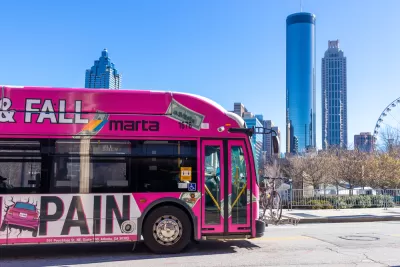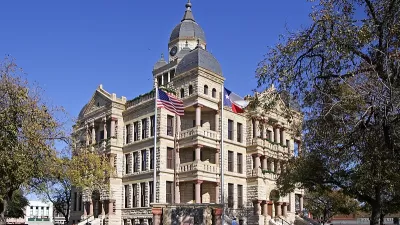From small rural towns to metro Atlanta, Georgia communities are experimenting with on-demand transit to improve connections to existing transit and offer transportation to isolated communities.

“In the past 18 months, on-demand transit has launched across Georgia, from Atlanta to Valdosta to Gainesville,” writes John Ruch. “Advocates and critics differ on the details while agreeing on-demand has its place and its unknowns.”
“Providing fast, low-cost service for last-mile connectivity and other short trips has been difficult and it limits the appeal of transit as a mode of travel. If we can solve that problem with services like the Buc and MARTA Reach, we can make it much easier for people to choose transit,” said Jim Durrett, executive director of the Buckhead Community Improvement District (CID), which funded the Buc shuttle in that neighborhood.
Critics say on-demand transit is “inherently far less efficient than fixed-route buses,” making it “best suited to small-town, rural and suburban-sprawl areas” as an option for hard-to-reach areas with few other transit options. This is exactly how several small Georgia communities, such as Valdosta and Hall County, are using it. In a much larger city, Atlanta’s MARTA is exploring microtransit as a solution for other goals. “In metro Atlanta, two new on-demand programs are aimed at ‘last-mile connectivity’ for fixed-route transit riders, with the implication of boosting overall transit ridership.”
The next six months, writes Ruch, should provide a clearer picture of how effective on-demand transit programs will be in increasing ridership and bringing transit access to more Georgians.
FULL STORY: On-demand transit expands across Georgia, putting pitches and criticisms to the test

Maui's Vacation Rental Debate Turns Ugly
Verbal attacks, misinformation campaigns and fistfights plague a high-stakes debate to convert thousands of vacation rentals into long-term housing.

Planetizen Federal Action Tracker
A weekly monitor of how Trump’s orders and actions are impacting planners and planning in America.

In Urban Planning, AI Prompting Could be the New Design Thinking
Creativity has long been key to great urban design. What if we see AI as our new creative partner?

King County Supportive Housing Program Offers Hope for Unhoused Residents
The county is taking a ‘Housing First’ approach that prioritizes getting people into housing, then offering wraparound supportive services.

Researchers Use AI to Get Clearer Picture of US Housing
Analysts are using artificial intelligence to supercharge their research by allowing them to comb through data faster. Though these AI tools can be error prone, they save time and housing researchers are optimistic about the future.

Making Shared Micromobility More Inclusive
Cities and shared mobility system operators can do more to include people with disabilities in planning and operations, per a new report.
Urban Design for Planners 1: Software Tools
This six-course series explores essential urban design concepts using open source software and equips planners with the tools they need to participate fully in the urban design process.
Planning for Universal Design
Learn the tools for implementing Universal Design in planning regulations.
planning NEXT
Appalachian Highlands Housing Partners
Mpact (founded as Rail~Volution)
City of Camden Redevelopment Agency
City of Astoria
City of Portland
City of Laramie





























